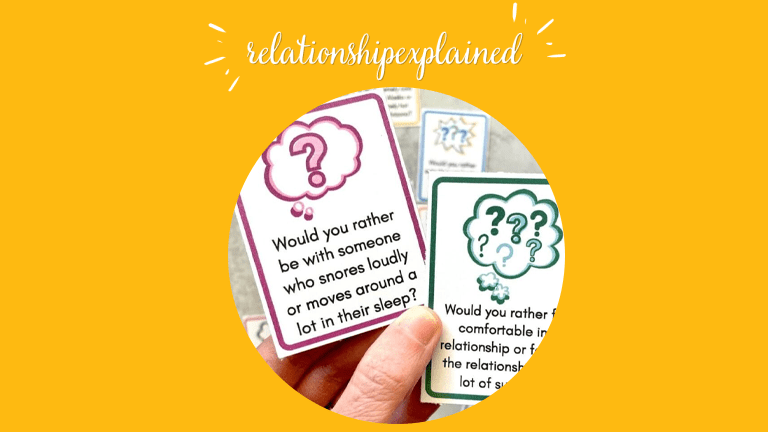Words of Affirmation Love Language
Ever feel like your partner isn't getting the message of how much they mean to you? Or perhaps you're not feeling the love and appreciation you crave? It might just be a case of speaking different love languages. Understanding these love languages can be the breakthrough you need for a thriving relationship. Let's dive into […]
Ever feel like your partner isn't getting the message of how much they mean to you?
Or perhaps you're not feeling the love and appreciation you crave? It might just be a case of speaking different love languages. Understanding these love languages can be the breakthrough you need for a thriving relationship. Let's dive into the words of affirmation love language, a powerful tool for nurturing intimacy and boosting self-esteem within your partnership.
Imagine how transformative it would be if you could communicate your love in a way that deeply resonates with your partner. Among the five love languages identified by Dr. Gary Chapman, words of affirmation focus on expressing affection through spoken words, praise, or appreciation. This article will guide you on how to use verbal expressions to reinforce your bond and make your partner feel valued and loved.
Well, we'll be going over:
- Why is understanding love languages crucial for relationship harmony?
- How can mastering the art of words of affirmation enhance your connection with your partner?
- What are some practical tips and examples to effectively convey love through affirmations?
Let's dive in!
Key Takeaways
- Understanding love languages can help you communicate love in a way that resonates with your partner.
- Words of affirmation is a love language that focuses on verbal expressions of love and appreciation.
- Communicating love through words of affirmation can help build intimacy and self-esteem in your relationship.
Understanding Love Languages
Love is a complex emotion, and people express it in different ways. Gary Chapman, a renowned marriage counselor, identified five distinct love languages that people use to express and experience love. Understanding these love languages can help you strengthen your relationships and improve communication.
The Five Love Languages Explained
The five love languages are:
- Words of affirmation
- Quality time
- Acts of service
- Physical touch
- Receiving gifts
Words of affirmation refer to verbal expressions of love and appreciation, such as compliments, encouragement, and recognition. Quality time involves giving someone your undivided attention and engaging in activities together. Acts of service refer to doing things for someone, such as cooking a meal or running an errand. Physical touch involves non-sexual physical contact, such as holding hands or hugging. Receiving gifts refer to tangible expressions of love, such as thoughtful presents or tokens of appreciation.
Each person has a primary love language, which is the way they most naturally express and receive love. However, people can also appreciate and benefit from the other love languages.
Identifying Your Primary Love Language
To identify your primary love language, ask yourself:
- What makes you feel most loved and appreciated?
- How do you naturally express love to others?
- What do you request most often from your partner or loved ones?
Reflecting on these questions can help you determine your primary love language. Once you identify your primary love language, you can communicate it to your partner or loved ones, and they can adjust their behavior to show love in ways that resonate with you.
Understanding love languages can help you improve your relationships and communicate more effectively. By identifying your primary love language and those of your loved ones, you can show and receive love in ways that are meaningful and fulfilling.
Words of Affirmation as a Love Language
If you or your partner feel most loved when you hear words of affirmation, then you both speak the love language of words of affirmation. This love language is all about verbal expression and positive affirmation. In this section, we will explore the power of verbal compliments and expressions of appreciation and encouragement.
The Power of Verbal Compliments
Verbal compliments can be a powerful tool to make your partner feel loved and appreciated. Whether it's a simple "I love you" or a more elaborate expression of admiration, verbal compliments can go a long way in strengthening your relationship.
When giving compliments, it's important to be sincere and specific. Don't just say "you look nice today." Instead, try something like "that outfit looks amazing on you" or "your smile always brightens up my day." Specific compliments show that you are paying attention and that you truly appreciate your partner.
Expressions of Appreciation and Encouragement
In addition to compliments, expressions of appreciation and encouragement are also important for those who speak the love language of words of affirmation. These expressions can take many forms, from a simple "thank you" to a more detailed expression of gratitude.
When expressing appreciation, it's important to be specific and genuine. For example, instead of just saying "thanks for doing the dishes," try something like "I really appreciate the effort you put into keeping our home clean and tidy."
Encouragement is also important for those who speak the love language of words of affirmation. Encouragement can be as simple as saying "you can do this" or "I believe in you." These words of affirmation can help your partner feel supported and motivated to achieve their goals.
In conclusion, the love language of words of affirmation is all about verbal expression and positive affirmation. Verbal compliments, expressions of appreciation, and encouragement are powerful tools to make your partner feel loved and appreciated. By speaking each other's love language, you can build a stronger and more fulfilling relationship.
Communicating Love Through Words of Affirmation
If your partner's primary love language is words of affirmation, then it is important to communicate your love through positive and encouraging words. Effective verbal communication is key to maintaining a healthy relationship, and learning how to express your emotions through words can help you strengthen your bond.
Effective Verbal Communication in Relationships
When communicating with your partner, it is important to be clear and concise. Avoid making exaggerated or false claims, and try to use positive phrases that highlight the things that you appreciate about your partner. For example, instead of saying "I love you," try saying "I appreciate the way you always make me laugh."
In addition to using positive language, it is also important to actively listen to your partner. Pay attention to their body language and tone of voice, and try to understand their perspective. This will help you avoid misunderstandings and build trust in your relationship.
Examples of Affirming Language
If you are unsure how to express your love through words of affirmation, here are some examples of encouraging words and phrases that you can use:
- "I'm proud of you for..."
- "You make me feel..."
- "I appreciate it when you..."
- "You're really good at..."
- "I love the way you..."
By using these types of phrases, you can help your partner feel loved and appreciated. Remember, the goal is to communicate your emotions in a way that strengthens your bond and builds intimacy.
In conclusion, learning how to communicate your love through words of affirmation is an important part of maintaining a healthy and fulfilling relationship. By using positive language and actively listening to your partner, you can build trust and intimacy in your relationship.
Building Intimacy and Self-Esteem
If your partner's love language is words of affirmation, you may wonder how to build intimacy and self-esteem in your relationship. Words of affirmation are a powerful tool that can help you foster a deep connection with your partner. In this section, we will explore how empathy, understanding, and a positive self-image can help you build a more authentic and genuine relationship with your partner.
The Role of Empathy and Understanding
Empathy and understanding are essential when it comes to building intimacy in any relationship. When you take the time to understand your partner's perspective, you can communicate more effectively and show them that you care. When it comes to words of affirmation, empathy and understanding mean listening to your partner and acknowledging their feelings. It also means being willing to express your own feelings in an open and honest way.
Fostering a Positive Self-Image
Words of affirmation can also help you foster a positive self-image. When you hear positive feedback from your partner, it can boost your confidence and self-esteem. This, in turn, can help you be more authentic and genuine in your relationship. When you feel good about yourself, you are more likely to communicate openly and honestly with your partner. It can also help you be more accepting of your partner's flaws and imperfections.
In conclusion, building intimacy and self-esteem in a relationship requires empathy, understanding, and a positive self-image. When you make an effort to understand your partner's perspective and communicate openly, you can build a deeper connection. When you receive positive feedback from your partner, it can boost your confidence and help you be more authentic in your relationship. By focusing on words of affirmation, you can build a strong foundation for a healthy and fulfilling relationship.
Challenges and Misconceptions
Overcoming Criticism and Negative Comments
When you have a Words of Affirmation love language, you may find that criticism and negative comments can be particularly hurtful. It's important to remember that everyone has their own opinions, and not everyone will understand the way you express love. However, it's also important to recognize that criticism can be constructive, and it's important to listen to feedback that can help you grow as a person.
One way to overcome criticism is to practice vulnerability and compassion. When you are vulnerable, you open yourself up to criticism, but you also open yourself up to love and understanding. When you practice compassion, you can see things from another person's perspective, which can help you understand where they are coming from and why they may be critical.
Avoiding Misinterpretation of Affirmations
Another challenge you may face with a Words of Affirmation love language is misinterpretation of your affirmations. It's important to be clear and concise with your words, so that your partner understands exactly what you are trying to say.
One way to avoid misinterpretation is to use specific examples when giving affirmations. For example, instead of saying "you're great," you could say "I really appreciate the way you took care of me when I was sick last week." This helps to give your partner a clear understanding of what you appreciate about them.
It's also important to be aware of your tone of voice and body language when giving affirmations. If you are sarcastic or insincere, your partner may not believe that you truly mean what you are saying. Be genuine and sincere in your affirmations, and your partner will feel loved and appreciated.
In conclusion, the Words of Affirmation love language can be challenging at times, but with practice and patience, you can overcome criticism and avoid misinterpretation of your affirmations. Remember to be vulnerable and compassionate, use specific examples, and be genuine and sincere in your words.
Frequently Asked Questions
What are the best ways to express love through words of affirmation?
Expressing love through words of affirmation involves using words to communicate appreciation, affection, and admiration towards your partner. Some of the best ways to express love through words of affirmation include using positive affirmations, expressing gratitude for your partner, and using loving and supportive language.
How can I effectively communicate my need for words of affirmation to my partner?
Effective communication is crucial in any relationship, and it is essential to express your needs and desires to your partner. When communicating your need for words of affirmation, it is important to use "I" statements to avoid sounding accusatory. You can also provide specific examples of the type of language that makes you feel loved and appreciated.
What are some common mistakes to avoid when using words of affirmation as a love language?
When using words of affirmation as a love language, it is essential to avoid common mistakes that could undermine the effectiveness of this love language. Some common mistakes to avoid include insincerity, failing to follow through on promises, and using negative language or criticism.
How can words of affirmation be tailored to strengthen a marital relationship?
Words of affirmation can be tailored to strengthen a marital relationship by using them to express appreciation, support, and encouragement. It is essential to use language that is sincere and specific to your partner to make them feel valued and appreciated.
Can self-affirmation be considered part of the words of affirmation love language, and how?
Self-affirmation can be considered part of the words of affirmation love language as it involves using positive self-talk to build self-esteem and confidence. By affirming yourself, you become better equipped to affirm your partner and strengthen your relationship.
What alternatives can be used if my partner's primary love language is not words of affirmation?
If your partner's primary love language is not words of affirmation, it is important to find alternative ways to express your love and appreciation. Some alternatives include acts of service, quality time, physical touch, and gift-giving. It is essential to understand your partner's love language to effectively communicate your love and strengthen your relationship.












